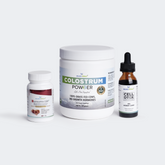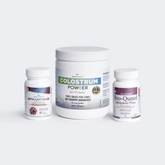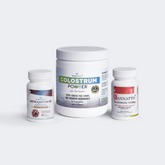How Long Does Adderall Stay in Your System?
Estimated Reading Time: 6 minutes
|You’ve taken Adderall; maybe as prescribed, maybe just once to stay sharp; and now you're wondering, how long does it actually stay in your system? It's a smart question, whether you're thinking about a drug test, managing side effects, or just curious about how your body processes it. The truth is, the timeline isn't the same for everyone. It depends on factors like dosage, metabolism, and even the type of Adderall you’ve taken. In this blog, we’ll walk through how long does adderall stay in your system, what affects it, and what you need to know.
First: What Is Adderall, Exactly?
Adderall is a prescription medication that contains two stimulant drugs:
-
Amphetamine
-
Dextroamphetamine
Together, they stimulate the central nervous system, boosting focus, alertness, and that locked-in feeling.
But your body also works hard to break it down: and depending on how your system works, it may stick around longer (or shorter) than you think.
Fun Fact
Adderall is considered a Schedule II drug in many countries, meaning it's tightly controlled because of its potential for abuse and dependence.
How Long Does Adderall Stay in Your System?
Here’s the short answer:
It depends on the type, dose, and your body.
Let’s break it down:
-
Immediate-Release (IR) Adderall
-
Starts working: Within 45–60 minutes
-
Peak concentration (Tmax): ~3 hours
-
Duration of action: ~4–6 hours
-
Extended-Release (XR) Adderall
-
Peak concentration (Tmax): ~7 hours
-
Duration of action: ~8–12 hours
Now here’s the catch; even if you feel the effects wear off after a few hours, the drug stays in your body longer.
So, how long exactly?
Detection Time by Test Type
Here's how different parts of your body process Adderall:
-
Blood: Detectable for up to 4 to 8 hours after use.
-
Urine: Usually detectable for 2 to 5 days after the last dose.
-
Saliva: Can show traces for 1 week.
-
Hair: This one sticks around upto 90 days after use.
Fun Fact:
Your hair stores almost everything; diet, stress, and even your medicine history. Creepy but true.
What Affects How Long Adderall Stays in You?
Not everyone clears Adderall at the same speed. Here's what can change things:
-
Your Metabolism
If you have a fast metabolism, you’ll flush it out quicker. People with slower metabolisms might hold on to it longer.
-
Water Intake
Staying hydrated helps your kidneys do their job. More water = faster flushing (but don’t overdo it, hoping to pass a test; it doesn't work that way).
-
Food in Your System
Taking Adderall on an empty stomach makes it work faster but might leave your system faster too. With food, it’s slower and steadier.
-
Age & Body Weight
Younger people usually process medicines faster. Heavier body mass can sometimes cause the drug to stick around longer.
-
Dosage & Frequency
The higher the dose and the more often you take it, the longer it lingers in your body. Makes sense, right?
Do You Know
Adderall is more alkaline, and alkaline urine can slow excretion; so the drug stays detectable longer.
Side Effects That May Outlast the Drug
Even after Adderall is technically “out” of your blood, you might still feel the after-effects. Common ones:
-
Trouble sleeping
-
Mood swings
-
Headaches
-
Low energy or “crash” feeling
-
Loss of appetite
These aren’t dangerous for most people, but if they keep happening, talk to a doctor.
Myth Buster
Some people think drinking coffee helps cancel Adderall effects. Both are stimulants; it might make things worse.
Can You Speed It Up?
Short answer: Not really.
Your body needs time. You can support it but not skip the queue.
Here’s what helps:
-
Drink plenty of water: Keeps your system hydrated and things moving smoothly.
-
Get good sleep: Rest helps your body process and recover faster.
-
Avoid caffeine and alcohol: They can interfere with how your body detoxes.
-
Eat light, healthy meals: Supports metabolism without overloading your digestive system.
-
Don’t panic; time is the real solution: Stress won’t speed it up; patience actually helps more.
Fun Corner
You can’t outsmart your liver. It works 24/7, doesn’t rush, doesn’t pause, and never listens to shortcuts.
Is Adderall Addictive?
It can be; if misused.
Taking more than prescribed, taking it without a diagnosis, or using it to “get high” increases your risk of addiction. Your brain may start depending on that outside boost, and you might feel low or unfocused without it.
That’s why it's a controlled substance in many countries.
So, Should You Be Worried?
If you’re using Adderall under doctor’s supervision, and you’re following instructions, you probably don’t need to worry.
But:
-
Don’t mix it with alcohol
-
Don’t skip doses and then double the next day
-
Don’t share your medicine with anyone else
-
Don’t treat it like an energy drink
If you’re taking it without a prescription; you’re playing with your health.
Reality Check
The short-term “focus” is not worth long-term health issues. There are better, safer ways to manage workload and concentration.
When You Should Talk to a Doctor
If you’re:
-
Switching ADHD medications
-
Facing a job or school drug screen
-
Experiencing side effects (e.g., insomnia, anxiety, chest tightness)
-
Pregnant, breastfeeding, or on multiple medications
…a medical professional can help guide safe timing, testing, and dosage adjustments.
Your Next Smart Step (Not a Retread)
Here’s what matters: smart planning beats panic. If a drug test is scheduled, or you're switching medicines, give your provider a heads-up. They can help you manage dosage, timing, and healthy recovery strategies—so you're not guessing or stressing at the last minute.
So, “how long does Adderall stay in your system?” isn’t just a trivia question—it’s part of a bigger picture. Managing Adderall isn’t just about how long it stays — it’s about staying in control, safe, and ahead of any decisions you need to make.
Key Takeaways
-
Adderall stays in your system longer than its effects last, with the exact duration.
-
Blood tests detect it for a few hours, urine tests for a few days, and hair tests for months.
-
Factors like metabolism, hydration, and dosage all impact how long Adderall stays in your system and how quickly it clears out.
-
You can’t rush it out — hydration and rest help, but time is key.
-
If you’re on Adderall (or stopping it), talk to your provider for safe guidance.
Disclaimer: This blog is for informational purposes only and does not provide medical advice. Always consult a healthcare professional before making changes to your diet or health routine. Individual results may vary.
References
-
Food and Drug Administration. ADDERALL ® (CII).; (2007). https://www.accessdata.fda.gov/drugsatfda_docs/label/2007/011522s040lbl.pdf (Accessed on: 21/06/2025)
-
Berman SM, Kuczenski R, McCracken JT, London ED. Potential adverse effects of amphetamine treatment on brain and behavior: a review. Molecular Psychiatry. (2008);14(2):123-142. https://doi.org/10.1038/mp.2008.90 (Accessed on: 21/06/2025)
-
Shoar NS, Marwaha R, Molla M. Dextroamphetamine-Amphetamine. Nih.gov. Published 2023. https://www.ncbi.nlm.nih.gov/books/NBK507808/ (Accessed on: 21/06/2025)
-
Better Health. Amphetamines. Vic.gov.au. Published (2012). https://www.betterhealth.vic.gov.au/health/healthyliving/amphetamines (Accessed on: 21/06/2025)
-
Andås HT, Enger A, Øiestad ÅML, et al. Extended Detection of Amphetamine and Methamphetamine in Oral Fluid. Therapeutic Drug Monitoring. (2016);38(1):114-119. https://doi.org/10.1097/ftd.0000000000000248 (Accessed on: 21/06/2025)
-
Suwannachom N, Thananchai T, Junkuy A, O’Brien TE, Sribanditmongkol P. Duration of detection of methamphetamine in hair after abstinence. Forensic Science International. (2015);254:80-86. https://doi.org/10.1016/j.forsciint.2015.06.030 (Accessed on: 21/06/2025)
-
Iqbal T, Elahi A, Wijns W, Shahzad A. Cortisol detection methods for stress monitoring in connected health. Health Sciences Review. (2023);6:100079. https://doi.org/10.1016/j.hsr.2023.100079 (Accessed on: 21/06/2025)
-
Verdejo-Garcia A, Crossin R. Nutritional and metabolic alterations arising from stimulant use: A targeted review of an emerging field. Neuroscience & Biobehavioral Reviews. (2021);120:303-306. https://doi.org/10.1016/j.neubiorev.2020.11.006 (Accessed on: 21/06/2025)
-
Huang W, Czuba LC, Isoherranen N. Mechanistic PBPK Modeling of Urine pH Effect on Renal and Systemic Disposition of Methamphetamine and Amphetamine. The Journal of Pharmacology and Experimental Therapeutics. (2020);373(3):488-501. https://doi.org/10.1124/jpet.120.264994 (Accessed on: 21/06/2025)
-
Evans J, Battisti AS, Richards JR. Caffeine. National Library of Medicine. Published May 29, 2024. https://www.ncbi.nlm.nih.gov/books/NBK519490/ (Accessed on: 21/06/2025)





































